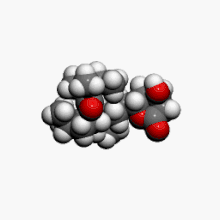Heart Protection Study
The Heart Protection Study was a randomized controlled trial run by the Clinical Trial Service Unit, and funded by the Medical Research Council (MRC) and the British Heart Foundation (BHF) in the United Kingdom. It studied the use of the cholesterol lowering drug, simvastatin 40 mg and vitamin supplementation (vitamin E, vitamin C and beta carotene) in people who were at risk of cardiovascular disease. It was led by Jane Armitage, an epidemiologist at the Clinical Trial Service Unit.[1][2]
| Heart Protection Study | |
|---|---|
 Simvastatin 3D | |
| Type of project | randomized controlled trial |
| Country | United Kingdom |
| Funding |
|
| Status | Completed |
Results
An outline of the study protocol was published in 1999.[3] Initial results[4] were published in 2002, which indicated that vitamins made little difference in modifying cardiovascular risk, but that simvastatin could significantly reduce the risk of cardiovascular events. Further publications, from 2003 and 2004, were concerned with the efficacy of simvastatin in diabetes patients[5] and preventing stroke.[6] A 2005 paper analyses the cost-effectiveness of a prescribing strategy similar to the one employed in the study.[7]
Interpretation
The HPS is to date the largest study to investigate the use of statins in the prevention of cardiovascular disease. While there have been concerns about side-effects associated with statins (myopathy and rhabdomyolysis), these were rare in this study.
The number needed to treat in the study was 57 to postpone one death and 19 to prevent one cardiovascular "event" (in those taking the drug simvastatin for 5 years). There was no mortality benefit in women with a statistical "p-value" that did not reach significance (0.08) while the Kaplan-Meier mortality curves, for men and women separately, have not been published as of 2016. Cancer risk was not significantly lower in the treatment group; in fact, there was no difference except for non-melanoma skin cancers, wherein the placebo group had a barely-significant lower risk of diagnosis. No worsening of lung disease was found, an initial concern with statin drugs, and simvastatin did not decrease osteoporosis.
See also
References
- "Professor Jane Armitage recognised for services to medical research — Oxford Clinical Trial Service Unit & Epidemiological Studies Unit (CTSU)". www.ctsu.ox.ac.uk. Retrieved 2019-06-19.
- Myat, Aung; Gershlick, A. H.; Gershlick, Tony (2012). Landmark Papers in Cardiovascular Medicine. Oxford University Press. p. 32. ISBN 978-0-19-959476-4.
- "MRC/BHF Heart Protection Study of cholesterol-lowering therapy and of antioxidant vitamin supplementation in a wide range of patients at increased risk of coronary heart disease death: Early safety and efficacy experience". European Heart Journal. 20 (10): 725–41. 1999. doi:10.1053/euhj.1998.1350. PMID 10329064.
- Heart Protection Study Collaborative Group (2002). "MRC/BHF Heart Protection Study of cholesterol lowering with simvastatin in 20 536 high-risk individuals: a randomised placebocontrolled trial". The Lancet. 360 (9326): 7–22. doi:10.1016/S0140-6736(02)09327-3. PMID 12114036.
- Collins, R; Armitage, J; Parish, S; Sleigh, P; Peto, R; Heart Protection Study Collaborative Group (2003). "MRC/BHF Heart Protection Study of cholesterol-lowering with simvastatin in 5963 people with diabetes: A randomised placebo-controlled trial". Lancet. 361 (9374): 2005–16. doi:10.1016/s0140-6736(03)13636-7. PMID 12814710.
- Collins, R; Armitage, J; Parish, S; Sleight, P; Peto, R; Heart Protection Study Collaborative Group (2004). "Effects of cholesterol-lowering with simvastatin on stroke and other major vascular events in 20536 people with cerebrovascular disease or other high-risk conditions". The Lancet. 363 (9411): 757–67. doi:10.1016/S0140-6736(04)15690-0. PMID 15016485.
- Mihaylova, B; Briggs, A; Armitage, J; Parish, S; Gray, A; Collins, R; Heart Protection Study Collaborative Group (2005). "Cost-effectiveness of simvastatin in people at different levels of vascular disease risk: Economic analysis of a randomised trial in 20,536 individuals". The Lancet. 365 (9473): 1779–85. doi:10.1016/S0140-6736(05)63014-0. PMID 15910950.